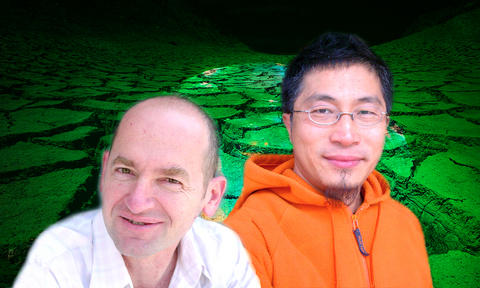The late 1990s saw a plethora of biennials sprouting up around the world as organizers realized the benefits these art showcases brought to their cities. Some are well known, like Venice and Sao Paulo, but all bring some level of international recognition and create important cross-cultural ties.
Taipei's first international biennial happened in 1998 at the Taipei Fine Arts Museum and was initiated by Lin Mun-lee (林曼麗), now director of the National Palace Museum.
Formerly known as the forerunner of Asian biennials, the Taipei Biennial lost some of its prestige in 2004. Furthermore, most biennials scheduled for 2008 formally announced their curators at the Venice Biennale in June 2007, so Taiwan, having just made the formal announcement last week, is a bit late.

PHOTO: COURTESY OF PET TEAM
Some would say it was worth the wait, though, as the Taipei Biennial 2008 curators are Manray Hsu (徐文瑞) and Vasif Kortun.
Taiwanese curator Manray Hsu is no newcomer to the biennial. He was co-curator for the year 2000 event, titled The Sky is the Limit, and co-curated Naked Life at the Museum of Contemporary Art (台北當代藝術館) last year.
Vasif Kortun is the Director of Platform Garanti Contemporary Art Center in Istanbul and received the award for Curatorial Excellence from the Center for Curatorial Studies, Bard College in New York last year. He also served as director of the Istanbul Biennial in 1992 and 2005.
Taipei's biennials usually open in November, but next year's will take place in September in order to coordinate with the seven other biennial cities: Guangzhou and Shanghai, China; Busan and Gwangju, South Korea; Yokohama, Japan; Singapore; and Sydney, Australia.
The 2004 event took place on two floors of the Taipei Fine Arts Museum and felt more like an exhibition than a biennial. This year, museum organizers plan to expand the biennial with lectures and art exhibitions outside of the museum. This should attract foreign visitors, who will also help boost the local economy.
It is the museum's hope that the Taipei Biennial 2008 can strengthen Taiwan's position in the international art world, while establishing a major cultural network island-wide.
After the biennial in 2004, local artists petitioned for an outside committee to oversee subsequent events and called for an overhaul of the Taipei Biennial. Its six-month preparatory time-frame, limited budget, minimal promotion and pairing of experienced Western and Taiwanese curators have, in the past, led to problems.

Behind a car repair business on a nondescript Thai street are the cherished pets of a rising TikTok animal influencer: two lions and a 200-kilogram lion-tiger hybrid called “Big George.” Lion ownership is legal in Thailand, and Tharnuwarht Plengkemratch is an enthusiastic advocate, posting updates on his feline companions to nearly three million followers. “They’re playful and affectionate, just like dogs or cats,” he said from inside their cage complex at his home in the northern city of Chiang Mai. Thailand’s captive lion population has exploded in recent years, with nearly 500 registered in zoos, breeding farms, petting cafes and homes. Experts warn the

The unexpected collapse of the recall campaigns is being viewed through many lenses, most of them skewed and self-absorbed. The international media unsurprisingly focuses on what they perceive as the message that Taiwanese voters were sending in the failure of the mass recall, especially to China, the US and to friendly Western nations. This made some sense prior to early last month. One of the main arguments used by recall campaigners for recalling Chinese Nationalist Party (KMT) lawmakers was that they were too pro-China, and by extension not to be trusted with defending the nation. Also by extension, that argument could be

Aug. 4 to Aug. 10 When Coca-Cola finally pushed its way into Taiwan’s market in 1968, it allegedly vowed to wipe out its major domestic rival Hey Song within five years. But Hey Song, which began as a manual operation in a family cow shed in 1925, had proven its resilience, surviving numerous setbacks — including the loss of autonomy and nearly all its assets due to the Japanese colonial government’s wartime economic policy. By the 1960s, Hey Song had risen to the top of Taiwan’s beverage industry. This success was driven not only by president Chang Wen-chi’s

Last week, on the heels of the recall election that turned out so badly for Taiwan, came the news that US President Donald Trump had blocked the transit of President William Lai (賴清德) through the US on his way to Latin America. A few days later the international media reported that in June a scheduled visit by Minister of National Defense Wellington Koo (顧立雄) for high level meetings was canceled by the US after China’s President Xi Jinping (習近平) asked Trump to curb US engagement with Taiwan during a June phone call. The cancellation of Lai’s transit was a gaudy